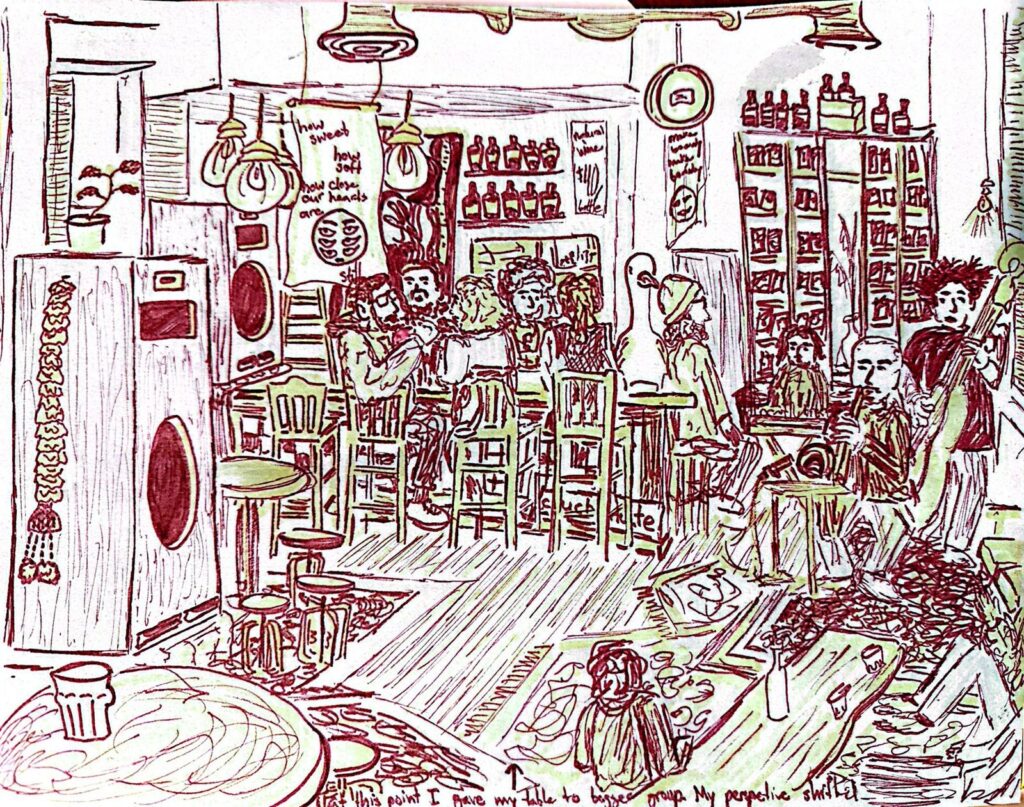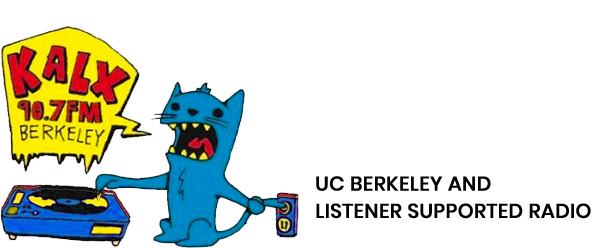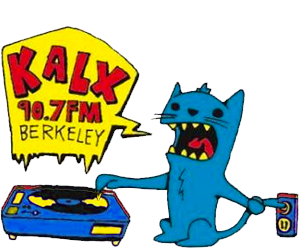“We are the Rev Trio, thank you for having us. It’s gonna be a night of avant-garde swing, bebop, whatever you’re feeling.” I sit on an old carpet, writing on the menu atop a slab of some sort of oak. My eyes are at knee level. “Where the keys at?” A man in black Converse, gray straight-cut wool pants asks. My eyes pan up: black wool coat, strong hands, clasping metal can, grey hair poking out of an orange beanie, which reads ‘k’-something, but he doesn’t turn his head more this way for me to read the rest. He steps closer to see the pianist, hidden behind the bar of this triangular building.
The venue, Couchdate, has only been open for two months, but the owner, Emanuel, and his group of friends have been throwing pop-ups around the East Bay for years. The room is lit with glass orbs, each corner of a different primary color. We, on this carpet, are in the blue corner. A femme presenting person who wouldn’t consider themselves an astrologer but knows astrology sits next to me. Further down the table, two wine glasses sit half full, two faces turned towards the saxophonist and the band lead, Amadeo. The band: a saxophone, contrabass, and electronic keyboard are dwarfed by a wall of wine and vinyl. Burna Boy and Pharoh Sanders are a few pieces of album art I can make out from across the room.
“The next one is called ‘A Place Somewhere’ written by our pianist.” The saxophonist speaks into the mic. The music, a slow melody, shakes the place through two hi-fi speakers resting on the bar. This shake isn’t jarring but is akin to being rocked slowly through space, the listener able to explore each wave that forms each vibration that forms each chord. It’s different to hear jazz that isn’t the standards. Music that explores out into the unknown portions of our sonic universe. The next arrangement, “Strawberry Poptart,” brings a different emotion. The sax player leans low, his instrument between his jean covered knees, and allows the sax (or spirits) to take control, their story to fill the space.
What does it mean for us to hear, gathered here? The cellist and pianist make eye contact when they play. I wish I knew more about music theory, so I would have more to say, but as Noah Warren says about poetry, which may be appropriate in this context. “You don’t have to study poetry for it to hit, but if you study for a bit, it might hit differently.”

The second act was Sikander, a South Asian musician with roots in what is now Pakistan and Bangladesh. He plays popular works from Bollywood and Pakistan. He takes the stage in a long, printed silk shawl made by Rizwan Beyg, a well-known designer in Karachi, over a forest green kurta set made by his tailor back home in Karachi, Bari & Sons. In his hands, a beautiful spruce and maple violin handcrafted by the renowned Palestinian luthier Shehada Shalada.
He begins to play without saying a word. The crowd quiets when his violin starts to sing. “Hi, I’m Sikander from New York,” he says after his first song, “and this is my West Coast debut. I’ve never been to the Bay before, and you might be the most diverse crowd I’ve played for… This next one is a classic from probably our parents’ generation.”
He begins again on the violin. It’s a Bollywood song. “How many of you speak Hindi or Urdu?” he asks. A couple of claps from across the now full venue, most folks sitting cross-legged on the floor. In the silence, the sound of a woman’s lips slowly touching the cheek of her lover is perceptible behind me.
“Well, if you know this next one, sing along.” Bow on string, his arm moves in sweeping strokes, with gusto, with confidence. He gives this history of each piece as he plays. I feel like I’m at the orchestra, but a private house performance—like something back in the day only kings and the royal court would get to witness.
He has just started his next song, a ghazal from Faiz Ahmed Faiz, a revolutionary Marxist Pakistani poet, when I get a text. A friend from LA crashing on my couch tonight is outside my apartment, an hour away by bike. I must call it a night.
Review and art by Christopher LeBoa

